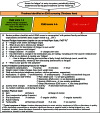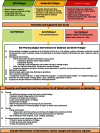A pan-Canadian practice guideline and algorithm: screening, assessment, and supportive care of adults with cancer-related fatigue
- PMID: 23737693
- PMCID: PMC3671030
- DOI: 10.3747/co.20.1302
A pan-Canadian practice guideline and algorithm: screening, assessment, and supportive care of adults with cancer-related fatigue
Abstract
Purpose: The purpose of the present systematic review was to develop a practice guideline to inform health care providers about screening, assessment, and effective management of cancer-related fatigue (crf) in adults.
Methods: The internationally endorsed adapte methodology was used to develop a practice guideline for pan-Canadian use. A systematic search of the literature identified a broad range of evidence: clinical practice guidelines, systematic reviews, and other guidance documents on the screening, assessment, and management of crf. The search included medline, embase, cinahl, the Cochrane Library, and other guideline and data sources to December 2009.
Results: Two clinical practice guidelines were identified for adaptation. Seven guidance documents and four systematic reviews also provided supplementary evidence to inform guideline recommendations. Health professionals across Canada provided expert feedback on the adapted recommendations in the practice guideline and algorithm through a participatory external review process.
Conclusions: Practice guidelines can facilitate the adoption of evidence-based assessment and interventions for adult cancer patients experiencing fatigue. Development of an algorithm to guide decision-making in practice may also foster the uptake of a guideline into routine care.
Keywords: Fatigue; adapted guideline; assessment; cancer; screening; supportive care; survivor; survivorship.
Figures


References
-
- Jones J, Howell D, Olsen KL, et al. Prevalence of cancerrelated fatigue in a population-based sample of colorectal, breast and prostate cancer survivors [abstract 9131] J Clin Oncol. 2012;30 [Available online at: http://meetinglibrary.asco.org/content/100355-114; cited April 24, 2013]
LinkOut - more resources
Full Text Sources
Other Literature Sources
Medical

